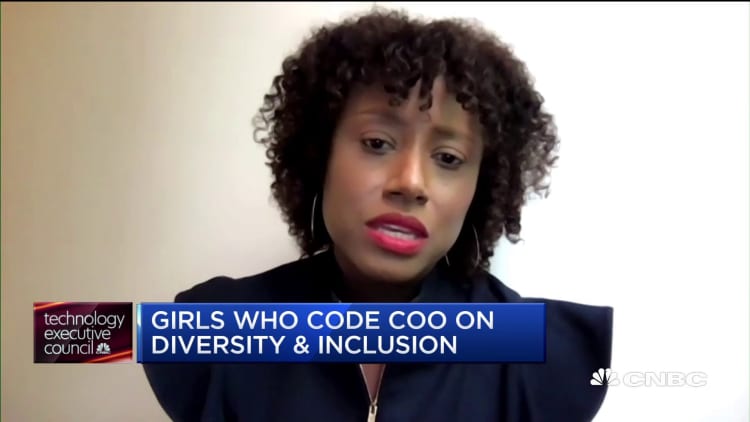
Building a diverse and inclusive workplace goes far beyond hiring. Especially when it comes to hiring women. That's according to Dr. Tarika Barrett, chief operating officer of Girls Who Code, an international nonprofit organization working to close the gender gap in technology. She is also a member CNBC's Technology Executive Council.
Dr. Barrett says that companies need to focus more on supporting women once they're in the door, whether that's through pay equity and promotions or more flexible policies for employees who are caregivers.
"I think for tech companies, the critical thing is to acknowledge where we are with women [and] with people of color during this pandemic," Dr. Barrett said on "Squawk Alley."
According to the Department of Labor, women's unemployment was nearly three points higher than men's in April, which many consider the height of the pandemic, at 16.2%. Additionally, according to an analysis by the National Women's Law Center, women held 77% of jobs in education and health services pre-pandemic but account for 83% of the jobs lost in those two sectors combined.
"When you look at the data, you have to kind of acknowledge the problem we're grappling with. Women make up less than 25% of the tech workforce, and for women of color it's only 18%," Dr. Barrett claims.
Hiring is only the beginning
It's true that women are disproportionately missing out, despite national conversations about the lack of diversity in tech. According to data from the National Center for Women & Information Technology, women make up 47% of all employed adults in the U.S., and they hold only 25% of computing roles. Of that 25% of women working in tech, Asian women make up just 5%, while Black and Hispanic women accounted for 3% and 1%, respectively. All this despite STEM jobs growing 79% since 1990, compared to overall employment which has grown only 34% in the same period of time, according to data from Pew Research Center.
"And so even though you're kind of asking these questions, it's not just about hiring. The fact is that nearly 40% of women with engineering degrees either quit soon after entering the field or they don't end up entering the field at all," Dr. Barrett said. "If you think specifically about this crisis and the impact that you're talking about and the data that you have, companies need to support women very differently."
As unemployment continues to rise, tech companies are struggling to find skilled workers to fill positions. That's according to the latest CNBC Technology Executive Council survey, which includes tech decision makers from some of the largest U.S. companies and organizations. In that survey, 32% of respondents say that it's gotten easier to find qualified employees to fill open positions, compared to 20% who say it's gotten harder compared to a year ago. However, nearly half of the respondents say that it's "about the same" as it was a year ago. In addition to finding qualified talent, additional concerns among tech executives include meeting customer demand and upgrading outdated IT in the next 12 months.
Twenty-five of the 146 members of the CNBC Technology Executive Council responded to this survey, which was conducted from June 3–15, 2020.






